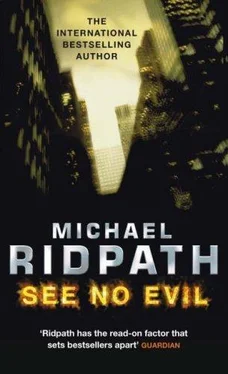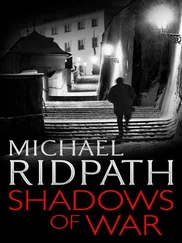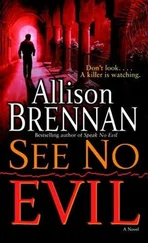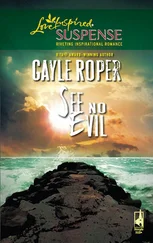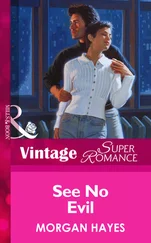‘There’s no point in denying it now, although I don’t think the outside world has ever realized just how close we were to bankruptcy. It was the old junk-bond story. We needed to do ever-bigger deals to raise the finance to pay off the debt on the old deals. When the stock market crashed in October ’87, the merry-go-round came to an abrupt halt and a lot of guys went flying off the sides. We would have gone too if we hadn’t closed the Herald deal. Since then we’ve been much more careful.’
‘You don’t have any South African papers left in the Zyl News group,’ Kim said. ‘I’ve often wondered why that is. I mean, I know you had to sell them in the 1980s to satisfy US investors, but surely there would be no problem in buying one or two now?’
‘It’s a small fragmented market and it’s very competitive,’ Edwin answered.
His father ignored him. ‘I’ve left South Africa behind me,’ he said. ‘I have a US passport, an American wife and I split my time between here and there. But not South Africa.’ He glanced at Kim. ‘I hope to God that you never have to learn this, but when your spouse dies, you reassess things. You begin to realize what’s important to you. In my case it was my family,’ he smiled at Caroline and Edwin. ‘Not my country.’
Kim struggled to keep a brave face at the reference to Todd’s situation. But Calder could see she was determined to find out more. ‘Did you consider leaving before Martha died?’
‘Yes, yes I did. As you know I was a consistent opponent of apartheid from when I bought my first newspapers in 1962. But during the eighties I became worried about what would happen when the regime did fall. The police were becoming ever more brutal, as were the ANC and the others. There were riots, my brother was blown up by a landmine, and then Martha...’ He sighed. ‘Then they got Martha. If I had only insisted we get out a few months earlier.’
‘So you have no regrets about leaving?’
‘No, none,’ Cornelius’s voice was firm. He paused, considering what to say next. ‘I am an Afrikaner. Rather, I was an Afrikaner. In the couple of years before Martha died that was becoming more and more important to me. During most of my adulthood I had denied my heritage. I criticized apartheid, I knew it was wrong, I passionately disagreed with the National Party and their loathsome ideas, I married an English-speaking South African, and then, God forbid, an American. My brothers and sisters believed I had betrayed my heritage, but I was happy to deny it. Until I saw the end coming.’
He sipped his wine, checking round the table to see if his audience were following him. They were.
‘I became convinced that once apartheid fell and a black majority government came to power the Afrikaner people would disappear. As the architects of apartheid, they would be destroyed, either immediately, or slowly over the decades. Take away apartheid, and there’s much about Afrikanerdom that seems worth preserving. There’s the language. And there’s the history. Afrikaners have been in Africa for three hundred years: we are African, we can’t go back to the Netherlands, or anywhere else for that matter. We suffered tremendous hardships to establish our way of life, the Great Trek from the Cape to the Transvaal, the battles against the Zulus and against the British. My ancestors suffered in the Boer War — my mother was born in the Bloemfontein concentration camp and my grandmother died there — and afterwards we were treated like second-class citizens. When my father was a boy if you were caught speaking Afrikaans at school you were told to stand in a corner and wear a dunce’s cap. Literally, a cap with a big “D” on it.
‘My father was a good man. You know he founded an Afrikaans newspaper, the Oudtshoorn Rekord? Well, the paper supported South Africa joining Britain in the Second World War and it opposed the National Party when they came to power in 1948 and brought in apartheid. Believe me, those positions weren’t popular with all his readers. But he also believed passionately in education. The only way the Afrikaner would ever be the equal of the Briton was if he received an equal education. He encouraged me to get into Stellenbosch and then into Oxford. And what did I do with all that education? Did I do my bit to help him and his kind? No, I turned my back on them.
‘I felt guilty about all this. It seems to be the destiny of the white South African to feel guilt in one form or other and that was mine. And then Martha was murdered...’
Cornelius hesitated. There was silence around the table. ‘She was a truly wonderful woman and we had a great time together. I guess you all know that there were some strains in our marriage for a few months before she died. Strains I’ve always regretted. When she died everything changed. I didn’t care who my ancestors were, what language they spoke, or how many of them had died slaughtering the Zulus at Blood River. I knew I had to get my family out of there as quickly as possible. And I did. We sold Hondehoek, sold or closed the papers, and started afresh in America and England. Caroline and Edwin are married to Americans, Todd married Kim. My grandchildren will have new countries. South Africa is in the past for all of us.’
‘Except for Zan,’ Edwin said.
Cornelius let slip a hint of mild irritation. ‘Except for Zan. But that’s her choice.’
‘Do you really think Martha was killed by ANC guerrillas?’ Kim asked.
Cornelius looked at her. ‘Probably.’ He held his hand up to stall Kim’s next question. ‘I know we can’t be sure. Perhaps it was poachers. There could have been a cover-up. Perhaps the security police killed her for some twisted reason known only to themselves. Or someone else. Frankly, I don’t want to know. Martha’s mother suggested that we raise her death with the Truth and Reconciliation Commission, but that’s the last thing I wanted. Having to listen to the sordid details of how some twisted thug, be he white or black, took it into his head to murder Martha. And it wouldn’t just be me listening, it would be the commissioners, and the press and the public. It would follow me in every newspaper article written about me from now onwards. Follow all of us: Edwin, Caroline, Todd, even you. Really, I’m glad I let it drop.’
‘Todd isn’t.’
‘I know.’
‘Alex has been helping me try to find out what really happened.’
‘Have you?’ Cornelius shot Calder a warning glance.
‘I asked him to,’ Kim said. ‘For example, what happened to the diary?’
‘You mean the one that Martha mentioned in her letter to her mother?’ Cornelius said. ‘The one I wasn’t supposed to read?’
‘Yes. That one.’
‘I’ve no idea. I didn’t even know she was keeping one.’
‘I did,’ Caroline said.
‘ You did?’
‘Yes. Remember I was only twelve, and I was around the house much more than you, Dad. I caught her a couple of times writing in a black book. A really neat black book, kind of small and mysterious. She looked embarrassed each time, she tried to hide what she was doing. She told me once it was private and I should never read it.’
‘Did you?’ asked Edwin.
‘No,’ said Caroline. ‘Although I was tempted to search for it, I never did.’
‘So you never saw her put it into the bottom drawer of her desk?’
‘No.’ Caroline hesitated, looking around the table. She appeared shy, but determined to say what she had to say. She was the only one of the van Zyls to have picked up a completely American accent, which made her seem a little bit of an outsider. The others kept quiet, waiting. ‘I saw her once doing something that I knew was wrong.’ She paused again. Cornelius’s brows were furrowed in disapproval, Kim was hanging on every word and so was Calder. Caroline decided to plough on. ‘She was sitting in a car outside our house, copying something down into the diary. It was from a sheaf of papers which were lying on top of a briefcase.’
Читать дальше
